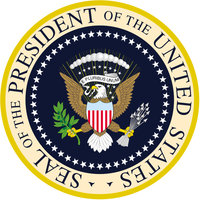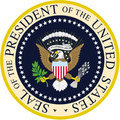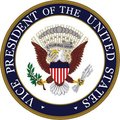William Henry Harrison
|
|
| ||
| Order: | 9th President | |
| Vice President: | John Tyler | |
| Term of office: | March 4, 1841 – April 4, 1841 | |
| Preceded by: | Martin Van Buren | |
| Succeeded by: | John Tyler | |
| Date of birth: | February 9, 1773 | |
| Place of birth: | Berkeley, Virginia | |
| Date of death: | April 4, 1841 | |
| Place of death: | Washington D.C. | |
| First Lady: | Anna Harrison | |
| Political party: | Whig party | |
William Henry Harrison (February 9, 1773–April 4, 1841) was an American military leader, politician, and the ninth President of the United States. He served as the first Governor of the Indiana Territory and later as a U.S. Representative and Senator from Ohio. Harrison first gained national fame as a war hero, defeating American Indians at the Battle of Tippecanoe in 1811 and earning the nickname "Tippecanoe" (or "Old Tippecanoe"). As a general in the subsequent War of 1812, his most notable contribution was a victory at the Battle of the Thames, in which Tecumseh was killed.
When Harrison took office in 1841 at the age 67, he was the oldest man to be elected President, a record that stood for 140 years, until Ronald Reagan was elected in 1980. Harrison died exactly one month into his term—the briefest presidency before or since.
| Contents |
Early years and military career
Harrison was born into a prominent political family at the Berkeley Plantation in Virginia, the third son of Benjamin Harrison V and Elizabeth Basset. His father was a Virginia planter who served as a delegate to the Continental Congress (1774–1777), signed the Declaration of Independence (1776), and was Governor of Virginia (1781–1784). William Henry Harrison's brother, Carter Bassett Harrison, later became a member of the House of Representatives, representing Virginia.
Harrison briefly attended several colleges, including Hampden-Sydney College, with the intention of becoming a physician. His father's death in 1791 left Harrison without money for further schooling and so, at the age of 18, he was commissioned as an ensign in the U.S. Army. He was sent to the Northwest Territory, where he spent much of his life. Harrison served as aide-de-camp to General "Mad Anthony" Wayne, from whom he learned how to successfully command an army on the American frontier. Harrison participated in Wayne's decisive victory at the Battle of Fallen Timbers in 1794, which brought the Northwest Indian War to a close. Lieutenant Harrison was one of the signers of the Treaty of Greenville in 1795, which opened much of present-day Ohio to settlement by white Americans.
Harrison resigned from the Army in 1798 to become Secretary of the Northwest Territory, and acted as governor when Governor Arthur St. Clair was absent. In 1799, Harrison was elected as the first delegate representing the Northwest Territory in Sixth United States Congress, serving from March 4, 1799, to May 14, 1800. As delegate, he successfully promoted the passage of the Harrison Land Act, which made it easier for people to purchase land for settlement in the Northwest Territory. Harrison resigned from Congress to become governor of the newly formed Indiana Territory, a post he held for 12 years, until 1813.
A primary responsibility as territorial governor was to obtain title to American Indian lands so that white settlement could expand in the area. Harrison oversaw numerous treaties, purchasing much of present-day Indiana from Native American leaders. Tensions, always high on the frontier, became much greater after the 1809 Treaty of Fort Wayne, in which Harrison secured the purchase of more than 2,500,000 acres (10,000 km²) of Indian land. An Indian resistance movement against U.S. expansion had been growing around the Shawnee brothers Tecumseh and Tenskwatawa ("The Prophet"). Tecumseh called upon Harrison to nullify the Treaty of Fort Wayne, warned against any whites moving into the land, and continued to widen his Indian confederation (see "Tecumseh's War"). In 1811, Harrison was authorized to march against the confederacy, winning his famous victory at Prophetstown next to the Wabash and Tippecanoe Rivers. During the War of 1812, Harrison took command of the Army of the Northwest. He won victories in Indiana and Ohio before invading Canada and crushing the British at the Battle of the Thames.
Post-war political career
After the war, he was elected to various political offices, including the U.S. House of Representatives from Ohio, serving from October 8, 1816, to March 3, 1819. He was defeated as a candidate for governor of Ohio in 1820, but served in the Ohio State Senate, 1819-1821. In 1824, he was elected to the U.S. Senate, where he served until May 20, 1828, when he resigned to become Minister to Colombia, 1828-1829. Harrison was a tall man, and when in Congress he was referred to by fellow westerners as a Buckeye, as were other tall pioneers on the Ohio frontier, as a term of endearment in respect of the Buckeye chestnut tree.
Harrison was the Northern Whig candidate for President in 1836, but lost the election to Martin Van Buren. He was the candidate again in the 1840 election, winning a landslide victory largely because of his heroic military record and the fact that the United States had suffered a severe economic downturn. His vice president was John Tyler, and their campaign was marked by exaggeration of both Harrison's military exploits and of his connections to the common man. Their campaign slogans of "Log Cabins and Hard Cider" and "Tippecanoe and Tyler too" are among the most famous in American politics.
Short presidency
As Harrison arrived in Washington he focused on showing that he was still the stalwart hero of Tippecanoe he had campaigned as. He was to take the oath of office on March 4, 1841, an extremely cold and windy day. Nevertheless, he faced the weather without his overcoat, delivering the longest inaugural address in American history, at nearly two hours (his friend and fellow Whig, Daniel Webster, had edited it for length). He subsequently caught a cold, which developed into pneumonia and pleurisy.His doctors tried everything to cure him. Opium, castor oil, pteroleum jelly, Virginia snakeweed, even actual snakes. But the treatments only made Harrison sicker and weaker until he went into delirium. He passed away a month later at 12:30 a.m. on April 4, 1841 of right lower lobe pneumonia, jaundice , and overwhelming septicemia, becoming the first American president to die in office. His last words were "Sir, I wish you to understand the true principles of the government. I wish them carried out. I ask nothing more. Harrison served the shortest term of any American president, a total of only 32 days and 12 hours and 30 minutes. John Tyler succeeded him to the Presidency shortly thereafter. According to later legends, Harrison's death was brought about by a curse placed on him by Tecumseh in his dying breath.
Harrison's son, John Scott Harrison, was also elected to the U.S. House of Representatives from Ohio, 1853-1857. Harrison's grandson, Benjamin Harrison of Ohio, became the 23rd president in 1889, making them the only grandparent-grandchild pair of presidents to date. In 1889, President Benjamin Harrison gave his inaugural address in the rain. Understanding his grandfather's mistakes, he asked his outgoing predecessor (and later his successor), Grover Cleveland, to hold an umbrella above his head, delivering the longest inaugural address since his grandfather's.
Cabinet
Reference
- Cleaves, Freeman. Old Tippecanoe: William Henry Harrison and His Time. New York: Scribner's, 1939.
History Clipart and Pictures
- Pictures of the US Presidents (http://classroomclipart.com/cgi-bin/kids/imageFolio.cgi?direct=History/United_States/Presidents)
- Clipart of American Presidents (http://classroomclipart.com/cgi-bin/kids/imageFolio.cgi?direct=Clipart/American_Presidents)
- Historical Pictures of the United States (http://classroomclipart.com/cgi-bin/kids/imageFolio.cgi?direct=History/United_States)
- Pictures of the American Revolution (http://classroomclipart.com/cgi-bin/kids/imageFolio.cgi?direct=History/United_States/American_Revolution)
- Civil Rights Pictures (http://classroomclipart.com/cgi-bin/kids/imageFolio.cgi?direct=History/United_States/Civil_Rights)
- Civil War Images (http://classroomclipart.com/cgi-bin/kids/imageFolio.cgi?direct=History/United_States/Civil_War)
- Pictures of Colonial America (http://classroomclipart.com/cgi-bin/kids/imageFolio.cgi?direct=History/United_States/Colonial_America)
- Historical US Illustrations (http://classroomclipart.com/cgi-bin/kids/imageFolio.cgi?direct=History/United_States/Illustrations)
- World War II Pictures (http://classroomclipart.com/cgi-bin/kids/imageFolio.cgi?direct=History/United_States/World_War_II)
- Pictures of Historical People (http://classroomclipart.com/cgi-bin/kids/imageFolio.cgi?direct=History/United_States/People)
External links
- White House biography (http://www.whitehouse.gov/history/presidents/wh9.html)
- Inaugural Address (http://www.usa-presidents.info/inaugural/harrison.html)
- Biography of William Henry Harrison (http://www.usa-presidents.info/harrison.htm)



